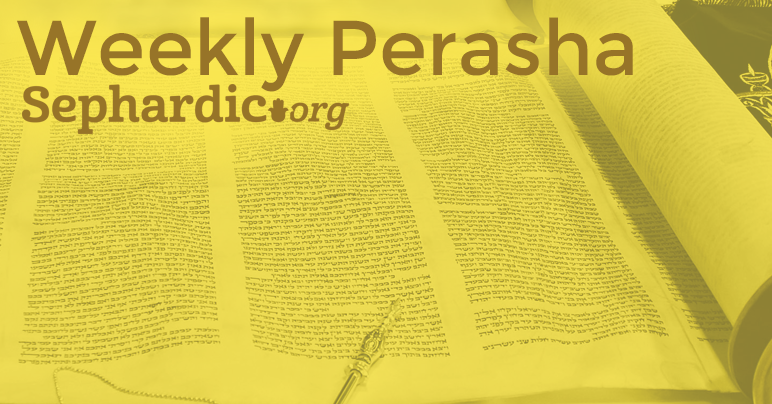
SHEMOT - DATAN AND AVIRAM
The names of Datan and Aviram are interpreted allegorically in the Talmud. Datan is so named as he transgressed the Dat -the law of Hashem. Aviram relates to the fact that he was Eiver - fortified against doing Teshuva. 1 These sons of Eliav and grandson’s of Reuven are referred to in the Talmud as the quarreling ones. 2 They begin their negative activities in Misrayim prior to Moshe's escape to Midyan; continuing to foment trouble upon Moshe's return to redeem Bene Yisrael. They appear again during the exodus from Misrayim and numerous times as the rebellious ones in the Midbar. Why do we find them as a constant source of harassment; causing Moshe what appears to be undue suffering even after (as we will see) the kindness he bestowed upon them? What was their source of strength to survive and continue for so many years unabated as fomenters of trouble? What instigated their rebellious nature even towards the Creator?
KINDNESS OF MOSHE
According to the Midrash, Datan was one of the Jewish officers - Shotrim - in Misrayim. An Egyptian taskmaster had relations with the wife of Datan and there was an ensuing quarrel. Moshe saw this taskmaster beating Datan, and came to his defense and killed the Egyptian. 3 Moshe went out the next day and saw Datan and Aviram quarreling regarding the previous day's incident. 4 Moshe in his kindness stepped in and prevented them from critically injuring one another.
HARASSMENT OF MOSHE
Thus began a series of defiant acts by these evil ones against Moshe who sacrificed his own position to show them kindness. R. Y. Shrem, a 19th century scholar from Aleppo cites the Midrash that Moshe smote the Misri using a Divine Name. 5 In killing the gentile, Moshe who had speech difficulties did not require to utter the two types sounds associated respectively with the letters Bet, Vav, Mem and Peh or Bumaph as well as Zayin, Samekh, Shin, Resh and Sadi or Zas-sharas. Datan and Aviram taunted Moshe by asserting that he lacked the linguistic ability to kill them. The Divine Name associated with the killing of a Jew differs they reasoned - as it does indeed require the sounds associated with these letters. 6 Moshe ran away realizing that they too (besides Par'oh) were hostile, even threatening to use the Divine Name against him! After his stay in Midyan, he is assured by Hashem “The men who seek your life have died." 7 The Talmud asserts that these men included Datan and Aviram who were no longer a threat as they had become impoverished; this according to the Talmud being synonymous with death. 8 R. Shrem explains that a condition to be able to make use of the Divine Name is that he not be one who accepts gifts from others to his own disgrace. Hence, Moshe was advised that their poverty stalled any intent to harm him. 9 We know that they did denounce Moshe to Par'oh and revealed that he was not actually the son of Par'oh's daughter. 10 They continued to incite the people against Moshe demanding a return to Misrayim at Yam Souf and again when the spies returned from Kena'an. They led the revolution of Qorah directed against Moshe. 11 They defied Moshe's summons; accusing him of having brought Bene Yisrael out of the fertile land of Misrayim in order to have them die in the Midbar. 12
REBELLION AGAINST HASHEM
Moshe instructs Bene Yisrael to only gather what was needed for daily consumption of the Maan - and under no circumstances may anything be left over. The Torah reveals that two men did not listen and did indeed save over their portions. On Shabbat the Jews were instructed by Hashem to refrain from gathering the - Maan. Nevertheless the Torah informs that "some" did go out to search on Shabbat in defiance of the rule of Hashem. The Midrash asserts that these rebels of Hashem's word were none other than Datan and Aviram. 13
SOURCE OF THEIR STRENGTH
R. Yonatan Domb cites a statement of R. Aha Bar Hanina found in the En Yaakov on Hulin. "All who do kindness for one who does not have the sense to recognize the good done for them ; it is as if he tosses a rock to the idolatry of Mercolies." 14 Namely the good the donor does for them, actually provides strength for their negativity. Datan and Aviram who were not recognizers of the good done by Moshe, were actually strengthened in their power to do evil through the kindness done for them by Moshe. The power of the greatest prophet's kindness served as fuel to propagate evil. This explains their success in perpetuating havoc amongst the people of Israel for so many decades. 15
WHY MOSHE SUFFERED AT THEIR HAND
Two related teachings are cited in the Talmud in the name of R. Elazar. "If a person does not have De’ah - understanding it is forbidden to have mercy on him" If one gives his bread to someone who does not "recognize good" - suffering comes upon him (the misguided donor). 16 R. Yisrael Kanievsky explains that this is not a reference to one born without understanding; rather the subject here is one who refuses to recognize the good done for him. 17 If the donor continues to have mercy on this type of individual - he himself will be the cause of his own suffering that befalls him. R. HaAri explains that this individual is rooted in negativity - as both he and the spiritual structure of evil is lacking the channel of Da’at. Hence one who is lacking De’ah is the physical manifestation of the structure of negativity - or the Qelipot. One who acts mercifully towards him - thereby gives power - sending an abundance of light to the structure of evil - the Sitra Ahara - through whom the giver will likely be harmed. 18 Moshe via his mercy towards Datan and Aviram - (who did not recognize the good done for them) generated thereby the suffering that befell him at their hand.
REBELLING AGAINST HASHEM
R. Baruch Rosenblum cites a teaching from the Mishnat R. Eliezer Ben Yose HaGelili - that if one begins to be an ingrate to his friend he will end up being an ingrate to his Creator. 19 This fits perfectly with what occurred with Datan and Aviram. They initially rebel against Moshe and end up rebelling against Hashem in the Midbar.
DOWNFALL OF DATAN AND AVIRAM - POWER OF SPEECH
Earlier we cited R. Shrem who asserted that Moshe feared their ability to use the Divine Name against him. Evidently, they had a power of speech which was used in all of their evil endeavors. It would be this power that would turn against them contributing to their downfall. It began according to the Ba'al HaTurim 20 when Reuven their grandfather had offered to take upon himself the responsibility to return Binyamin to Yaaqov. In his offer he said, "You may put my two sons to die". 21 This oath though not accepted by Yaaqov still contributed to the tragedy of Datan and Aviram. This conforming to the teaching in the Talmud that words contribute to a reality. 22 The Talmud teaches that when Moshe humbly went to dissuade Datan and Aviram from joining Qorah they were impertinent and insulting to him. 23 The Midrash calls out their response to Moshe's plea. "We will not go up". 24 This, the source asserts was their unconscious prophesy of their downfall. They would not go up, but rather would descend to Gehinam.
RECOGNIZING THE GOOD
R. HaAri teaches that Moshe Rabbenu was given in his current incarnation an aspect of the soul of Hevel. 25 Apparently then he had previously experienced the negative effects of providing kindness for an ingrate. Namely towards that of his brother - as taught by our Rabbis in the Midrash concerning the expression “And Qayin rose up against his brother Hevel.” R. Yohanan taught that in the midst of the argument amongst these brothers - Hevel had been over-powering his brother. While in a defensive position - Qayin reminded Hevel of how difficult it would be for him to go to his father and relate the fact that he had murdered his sibling. Hevel was thereby moved to have mercy on his brother and released him. Qayin seeing this - immediately rose up against Hevel and killed him. This is the source of the saying that one should not do kindness for the cruel for in the end the cruel will not have mercy on his own benefactor. 26 This series of events was to be once again perpetuated by a new set of ingrates in the persons of Datan and Aviram. This misappropriated kindness - being their source of strength propelling them to oppose Moshe and God all the way until their joining the rebellion of Qorah. We in contrast to Datan and Aviram must always strive to be grateful for all that is done for us by the Creator and our fellow human beings. This admirable trait will actually bring benefit not only to ourselves but will enhance and multiply the kindness done by our benefactor.
Shabbat Shalom
Victor Bibi








